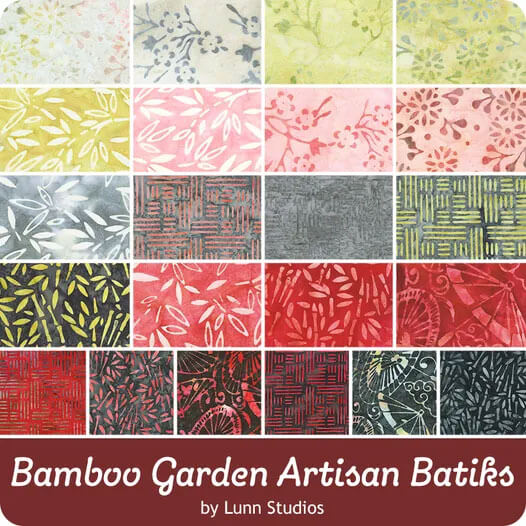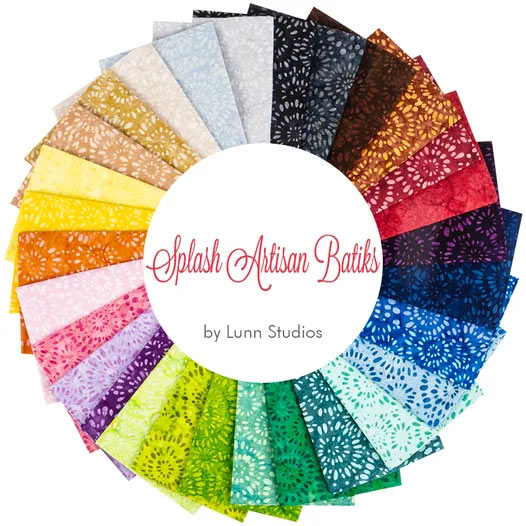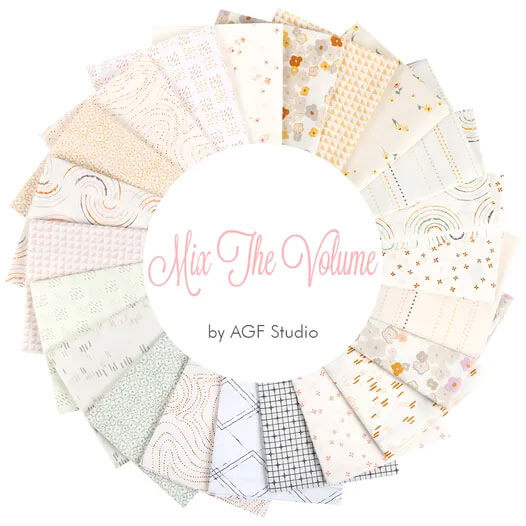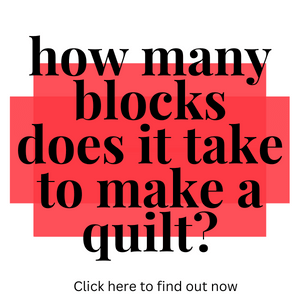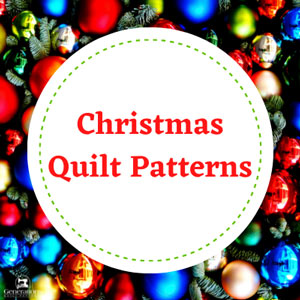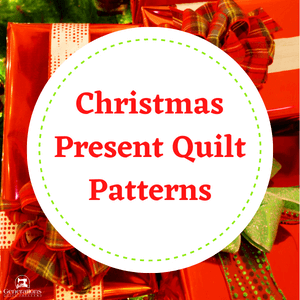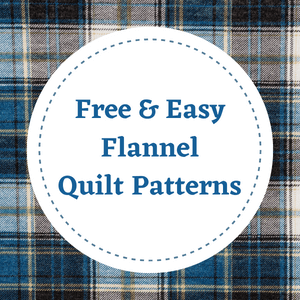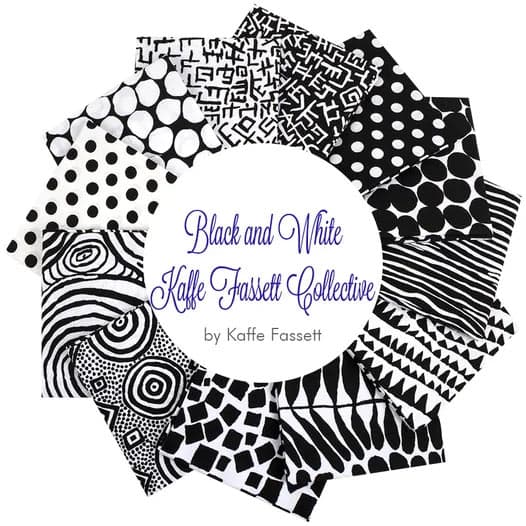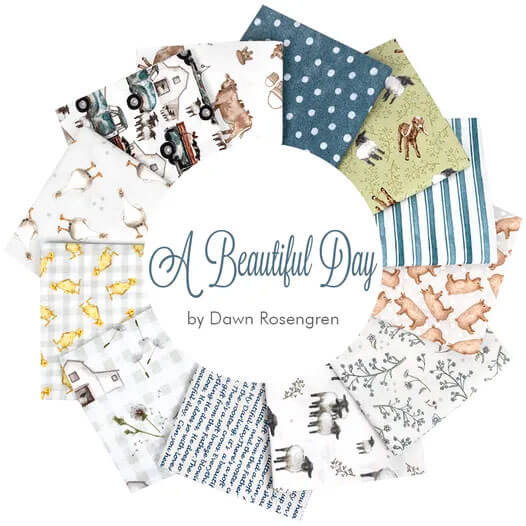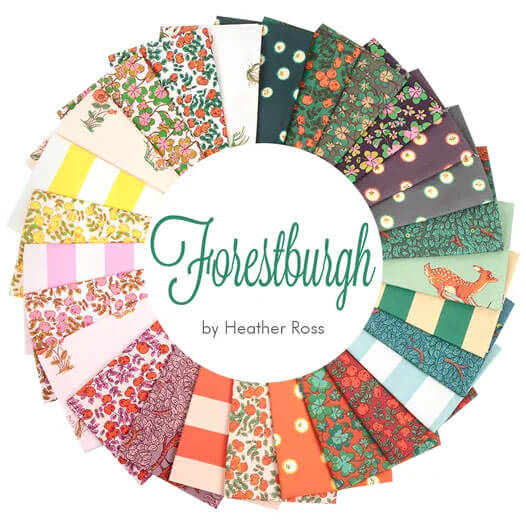- Home
- Free Quilt Block Patterns
- Monkey Wrench Quilt Block Pattern
Monkey Wrench Quilt Block Pattern
From our Free Quilt Block Patterns Library
This post contains affiliate links, for which I receive compensation.
Skill Level: Confident Beginner
This Monkey Wrench quilt block pattern is a variation of this version.
Instead of using plain half square triangles in the corners, Birds in the Air units are substituted in, adding a bit more interest with little increase in difficulty.
On this page you'll find directions and downloadable patterns for paper piecing the majority of this block, making it quick, easy and precise.
Don't you just love it when all the points on triangle are right where they should be.
Let's get started!
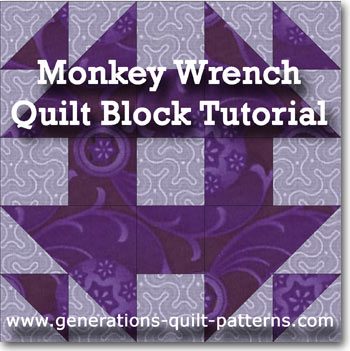
📋 General Instructions
All seam allowances (SA) are 1/4".
Pressing instructions are highlighted for easy reference.
When you are instructed to press, first press the pieced unit flat to set the seam. Then open the patch, pressing from the front.
You may want to reduce or eliminate the use of steam for pressing these paper pieced blocks. Steam tends to curl the paper.
Take a minute to review our favorite technique to getting the flattest quilt blocks you'll ever see. It works even with the paper attached. Now THAT'S sweet!
Step 1: Download the paper piecing patterns
You'll need the most current version of Adobe installed on your computer to download the pattern.
On the Adobe Print Menu page, under 'Page Size and Handling' set 'Custom Scale' to 100% before printing for accurate results. Click here to see what it looks like on the Print Menu page.
Print the Birds in the Air Units | ||
|---|---|---|
| Finished Block Size | # of copies | Link to PDF Download |
| 5" | 1 | 2" |
| 6-1/4" | 1 | 2-1/2" |
| 7-1/2" | 1 | 3" |
| 10" | 2 | 4" |
After printing, use the 1" square graphic on the printed pages to confirm they are printed accurately.
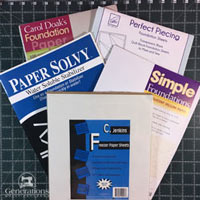
Not sure which paper to use?
Take a look at my review of several of the most popular brands available to us quilters on the market.
You want a super-easy paper to tear away—less stress on the stitches.
The newest quilt fabrics to tickle your fancy...
Click the images below to see the full collection. We share any commercial and/or free patterns that showcase them, too. (For inspiration, of course!)
Step 2: Cut the Monkey Wrench patches
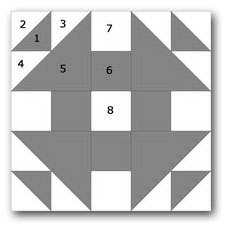 Monkey Wrench
Monkey WrenchSample Size: 10" finished / 10½" unfinished
Grid: 5x5
Attribution: Nancy Cabot
Design Type: Uneven 9-patch, small center
The patches for the paperpieced blocks are generously sized to making positioning them a breeze. The remaining patches (6, 7, 8) are cut to the exact size needed.
All the dimensions in the table below are for squares.
That means for Patch #1 for a 10" finished block cut two squares 2-7/8" x 2-7/8". Then sub cut it once on the diagonal.
 |
Cutting Chart for a~ Paper Piecing ~ | ||||||
|---|---|---|---|---|---|---|---|
| Patch | Fabric | Qty | Finished Block Size | Sub Cut | |||
| 5” | 6-1/4” | 7-1/2” | 10” | ||||
| A | 1 | 1 | 1-7/8” | 2-1/8” | 2-3/8” | 2-7/8” | |
| B | 2, 3, 4 | 2 | 2-3/8” | 2-5/8” | 2-7/8” | 3-3/8” | |
| A | 5 | 1 | 3-3/8” | 3-7/8” | 4-3/8” | 5-3/8” | |
| A | 6 | 4 | 1-1/2” | 1-3/4” | 2” | 2-1/2” | na |
| B | 7,8 | 5 | 1-1/2” | 1-3/4” | 2” | 2-1/2” | na |
| Grid Size | 1” | 1-1/4” | 1-1/2” | 2” | na | ||
Do you hate to paper piece?
All the patches are cut and ready to go!
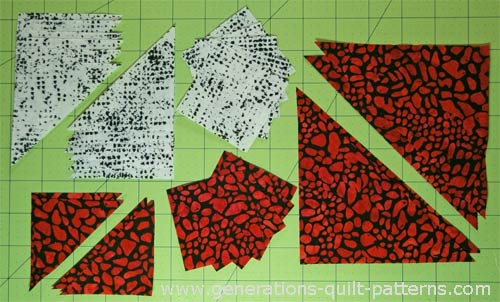
Step 3: Make the units in the Monkey Wrench quilt block pattern
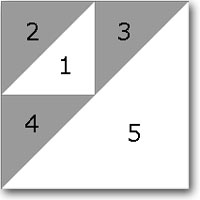
Birds in the Air Units
Make 4
For detailed instructions to make this unit, visit Birds in the Air block.
Cut out each of the units from the page you downloaded, cutting just beyond the dashed lines.
Use Elmer's Glue Stick, the kind that goes on purple and dries clear, to stick the wrong side of #1 to the unprinted side of the pattern. Use the dashed placement guidelines to help position it.
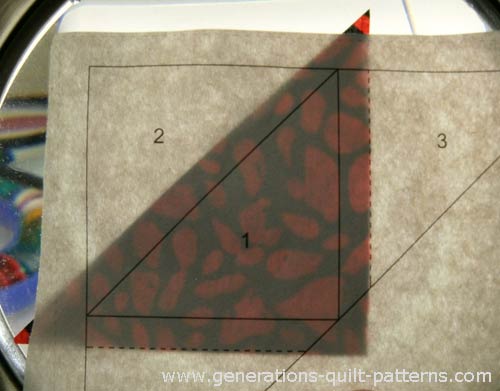
General Sewing Machine Setup for Paperpiecing
- Reduce your stitch length to 16–20 stitches per inch (1.3-1.6 mm). This perforates the paper and stabilizes the seam when you remove the pattern. [Learn more about stitch length here.]
- Reduce your machine's speed or just plain slow down. Sew only as fast as you can stay on the stitching lines.
- Install an open toe appliqué foot (sometimes called an 'embroidery' or 'satin stitch' foot) if you have one (it's easier to see where you're stitching with one installed).
- Use a larger needle (90/14) if you have problems removing the pattern.
- If your machine has a needle stop up, use it. The stitching goes faster when you don't have to lift the presser foot with every seam.
- As you stitch each seam, start and stop a generous 1/4” before and after the solid stitching lines. ALWAYS. Future lines of stitching secure the ends.
After adding each patch, press the unit as it was sewn to set the seam and then open. The SA is automatically pressed towards the last patch added.
Before adding the next patch, take a look to make sure the one you just added covers the space plus seam allowance that it is supposed to.
Steam is optional and usually curls the pattern.
If that bothers you, don't use steam. Sometimes I do. Sometimes I don't.
It truly depends on my mood.
Remember, as you follow this paper piecing tutorial, the printed and the fabric sides of this block are mirror-images of each other.
At last!
Let's sew!
With RST, align the long bias edge of a #2 triangle with the long bias edge of #1.
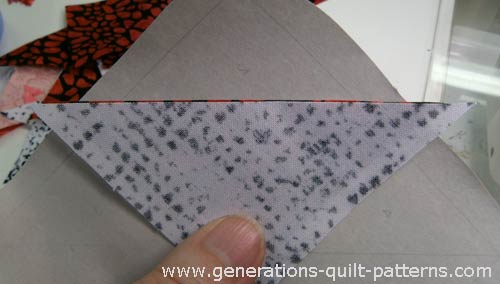
Stitch from the printed side, starting and stopping a 1/4" off the solid line.
Press. (If you've starched your quilt fabric, you should be able to fingerpress for this short piece.)
With RST, align #3 with #1. Stitch and press.
With RST, align #4 with the other side of #1. Stitch and press.
Establish the placement line for #5 by trimming the seam allowances of #3 and #4 to quarter inch. (Click here for instructions if needed).
With RST, lineup the edges of #3 and #4 with #5.
Stitch #5 from the printed side, starting and stopping a 1/4" off the solid stitching line. (see arrows below)
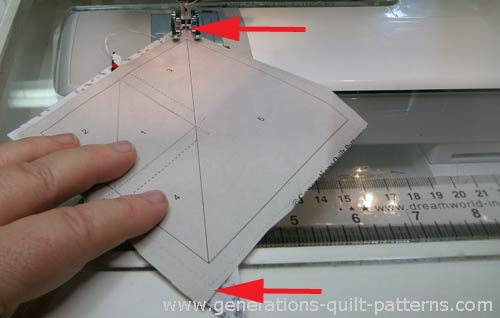
Press.
Trim these four units to size with your rotary ruler.
Pieced Rectangles
Make 4
With RST, stitch a light #6 to a dark #7, repeat for the remaining three pairs.
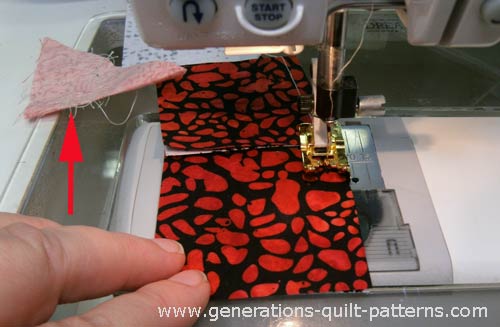
Press with the SA to the darker fabric.
Your finished units look like this and measure 2-1/2" x 4-1/2" at this point.
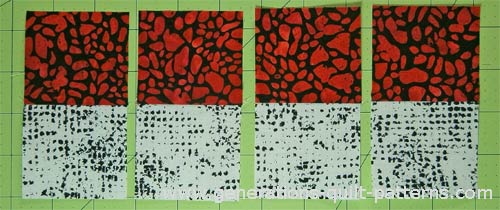
Step 4: Assemble your Monkey Wrench
Layout the pieced units and cut patches into rows.
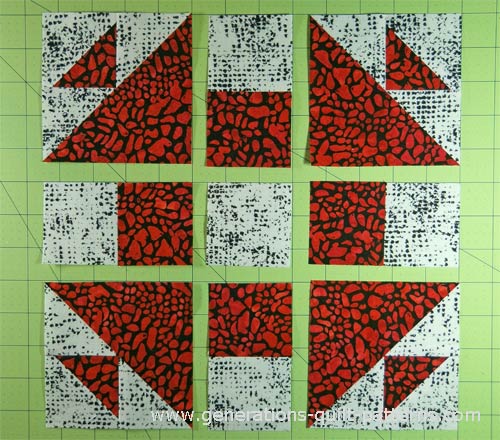
Stitch the units together into rows. Press with the seam allowance in the direction of the arrows below.
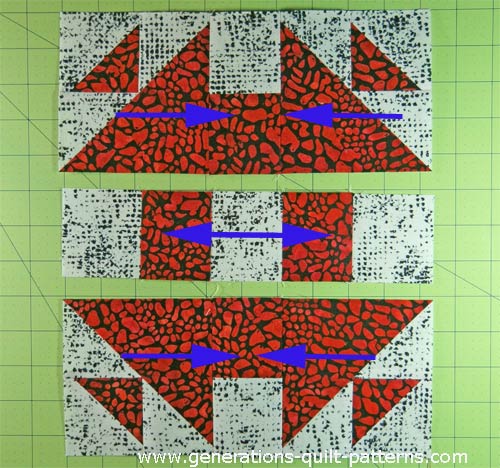
Stitch the rows together. The nested SAs will help you match the seam lines.
The is your finished Monkey Wrench quilt block pattern!
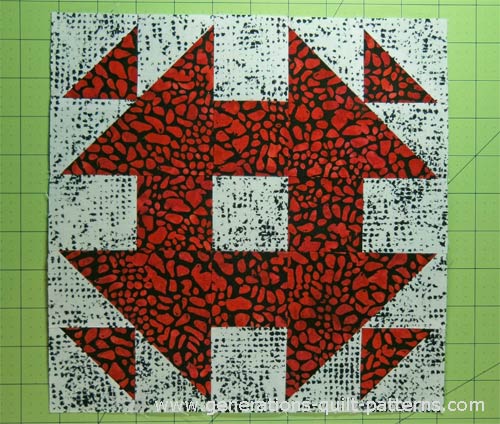 Our Monkey Wrench if complete!
Our Monkey Wrench if complete!Ready for another block?
There's lots more patterns where this one came from. Find them in our Free Quilt Block Pattern Library.
Need design inspiration? Then go to our Quilt Design 101.
What about a different quilt block?
For a list of all the 220+ quilt block patterns on this site, start here.
If you know the name of the block, shorten your search by using these links:
Click here if you're looking for blocks with at least some paper piecing.
Click here if you're looking for the basic building blocks of quilting, i.e., Flying Geese, half square triangles, quarter square triangles, etc., along with several techniques to make each.
And finally, use these links to find blocks in these finished sizes:
